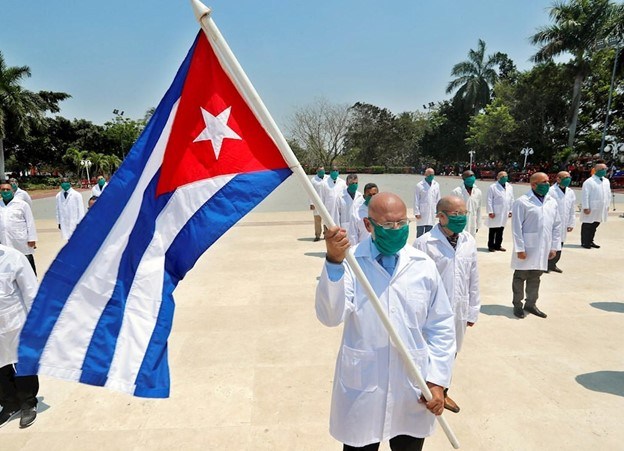
Cuban doctors go with State Security agents, they must hand over their diplomas, and their families remain in Cuba, hostages of the State
By Hector Schamis (Confidencial)
HAVANA TIMES – I attended a hearing of the Inter-American Commission on Human Rights (IACHR). It was requested by “Prisoners Defenders International,” an NGO based in Madrid, whose mission is to make visible and denounce human rights violations, mainly in Cuba. Precisely, the session was titled “Cuba: Human rights of people participating in medical missions.”
I am up on the subject and have written several texts since 2019. The truth is, Cuban medical missions expose with devastating force the hypocritical narrative of the dictatorship, perhaps like no other government action. In the discourse, Cuban missions are about the “excellence of its medicine” and the “solidarity of its revolution.” In reality, however, it is about propaganda, receiving hard currency, and social control. Extraction of surplus value, expressed in Marxist terminology for the party’s nomenclature.
The true conditions of Cuban doctors
In other words, exploitation, a salary that amounts to a fraction of the value produced by the task and well below the average salary for the same task in the destination country. The simple arithmetic of this gigantic business is unequivocal. Of the total program, only 10%-15% is allocated to pay the professionals. The remaining 85% goes to the Cuban government, which by this means collects between 8 to 10 billion dollars each year. It is the leading item in the Cuban state’s current accounts, surpassing tourism.
The evidence presented by Javier Larrondo, president of Prisoners Defenders, the testimony of witnesses, doctors who were part of the program in different countries, and the testimony of European parliamentarians is overwhelming. This is why the missions have been categorized under “contemporary forms of slavery, forced labor, and human trafficking” by the UN Special Rapporteur on contemporary forms of slavery and the Special Rapporteur on human trafficking.
It is a repressive system in which participants are recruited through pressure and threats. When they sign up, they are not informed of the destination, the duration of the trip, or the pay. They are not allowed to travel with family members. Their passport and academic diplomas are retained. Once at the destination, they must perform propaganda and indoctrination functions as requested.
They all live together under surveillance, with restricted schedules and the obligation to report any contact with people who are not members of the mission. They are accompanied by State Security agents who pretend to be doctors but perform intelligence functions with the Cubans to control defection, and political tasks entrusted by the receiving government, including proselytism.
The coercive design is like clockwork. Cuban doctors must hand over their diplomas and any other documentation accrediting them professionally to the mission leaders to prevent their labor insertion in case they decide to abandon the mission. At the same time, their families remain in Cuba, literally hostages of the State to reduce the likelihood of desertion.
The punitive instrument is the final part of the design, a totalitarian chaining. Abandonment of duties is punished with eight years of imprisonment in Cuba, but if the offender does not return, they are declared a “deserter.” At that moment, the Ministry of the Interior declares them “emigrated,” which entails the total loss of rights, including property. Immediately following is the declaration of “undesirable,” which prohibits entry to Cuba for eight years and causes family separation.
This legislation opens the possibility of losing parental rights, as the new “Family Code” of 2022 stipulates that the deserter is susceptible to such punishment, enabling the competent authority to administer it as necessary. Hence, in June 2022, the “Committee on the Rights of the Child” urged Cuba to end all separation of minors from their parents due to their decision to terminate a labor contract and to amend the Penal Code to eliminate obstacles preventing family reunification.
Because of all this, more than 5,000 children are separated from their father and/or mother for up to eight years. The repressive mechanism is hermetic. Children are hostages of the State in Cuba, while parents are hostages abroad. If they alter this condition, they face the worst punishment they can suffer: not seeing their children grow up, as testified tearfully by the witnesses at the hearing.
The romantic revolution that proclaimed the emancipation of the proletariat, in reality enslaves doctors. In Cuba, a healthcare professional must be willing to be a slave if they also want to be a parent to their children.
If the U-turn from socialism to capitalist mode of production, as in the post-communist European transition, was an aberration for Marxist thought, much more anomalous would have been a regression to a slave production mode. For that is what Cuban medical missions are. The party-state has made history go against the tide of history.
Read more from Cuba here on Havana Times.




